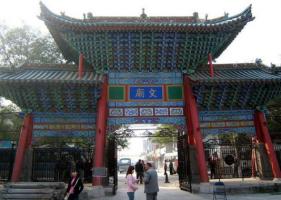New Silk Road Starts with Xian
G. Bin Zhao says a Silk Road economic belt, with Xian at the centre, should be part of a long-term strategy to bring economic prosperity to China's underdeveloped western region.
President Xi Jinping has again repeated his desire to create a Silk Road economic belt following a recent visit to Kazakhstan, where he proposed the idea as a way for European and Asian nations to promote closer economic ties.
In addition to its international strategic significance, the creation of the Silk Road belt would enhance economic development in western China, and have a far-reaching impact on regional development in general.
As China gradually moves forward with a new round of reform and opening up, the recent overall slowdown in economic growth has led to expectations that the development of western China will become the next great economic growth point. Furthermore, at the national level, there is a clear need to create a regional economic centre in western China.
Without economic development in the western region, a vast country like China cannot modernise
Therefore, the creation of this so-called economic belt, with Xian as the leading city, has become a priority. It will promote the western region and transform it into the fourth national economic pole along with the Yangtze River, the Pearl River Delta Region, and the Beijing-Tianjin-Hebei Economic Zone.
The creation of the Silk Road economic belt should be included as a part of the long-term development strategy for China, and the Greater Xian area - a region covering more than 12,000 square kilometres - should be designated as the core of this economic region.
Years of experience have shown that large-scale urban development and construction can have a significant effect in leading regional economic development. Xian, the historical starting point of the ancient Silk Road and the economic centre of northwest China - as well as a world famous historical, cultural, and international tourist city - is the best choice to be at the core of this economic belt.
In June 2009, the State Council issued the Guanzhong-Tianshui Economic Zone Development Plan, which stated that the area would be developed as a "strategic high ground for national economic development and opening up". Xian, as the largest city in this economic zone, was to have had an important role to play. Since that time, however, the region has not gained any significant policy support at the national level.
Without the strong support of the central government in promoting the balanced development of the region, capital and technology cannot be expected to automatically converge in the more economically backward regions, and this is especially true in the market-oriented economy we strive to build.
Without economic development in the western region, a vast country like China cannot successfully modernise. Without significant improvements in the conditions in western China, especially in the unstable frontier regions, the country's security, stability and unity will be affected in the long run.
The Silk Road economic belt will bring development to the poorer western China. The implementation of the Western Development Plan in 2000, though fruitful, did not significantly narrow its gap with the eastern coastal areas, and the regional imbalances in the country's economic development were not effectively mitigated.
Currently, 12 provinces, autonomous regions and municipalities are involved in the plan, and three economic zones - the Guanzhong-Tianshui, the Chengdu-Chongqing, and the Guangxi-Beibu Gulf - have been identified. The creation of the Silk Road economic belt would horizontally strengthen the western region's development. Practical experience has proved that regional development requires both the driving force and the dissemination effect of a strong central city along with an overall plan.
The Greater Xian area is an obvious choice to lead the Silk Road economic belt, and Xian is in a unique position to act as a bridgehead, ready to welcome industries that transfer from eastern China and to play its part in opening up western parts of the country.
The total economic output of Xian places it at the top of the cities in northwest China, and it is the largest city, with a current resident population of about 8.5 million. It is an important base for scientific research, higher education, defence, and other hi-tech industries.
As one of the world's four ancient capitals, it has the distinction of being the capital during the greatest number of dynasties in Chinese history, and as a result it has many cultural relics and tourist attractions. The city also has many research institutions and universities, placing it among the most developed areas for technology and education in China.
The Greater Xian area will be a centrally placed international city in the northwest comparable with Chongqing . In the current context of a new round of reform and opening up, combined with the recent economic slowdown, the time is right to develop this economic belt, in order to create the fourth national "economic star region" - along with the Shenzhen special economic zone, the Pudong new area, and the Tianjin-Binhai new area.
Finally, in order to more efficiently develop the Silk Road economic belt, balance the efforts directed at western development, and gather more resources in key cities, the feasibility of designating Xian as a municipality - and relocating the capital of Shaanxi province - should be studied.
As President Xi proposed, it is certainly reasonable to hope that the development of a Silk Road economic belt, with Xian at the forefront, will recreate the prosperous era that existed during the time of the ancient Silk Road, restoring the city to a position as one of the world's leading cultural and economic centres, driving economic development in northwestern China and boosting economic prosperity in the other western regions of the country.
G. Bin Zhao is executive editor at China's Economy & Policy, and co-founder of Gateway International Group, a global China consulting firm. Zhuoli Duan, a senior compliance manager at ABC-CA Fund Management, also contributed to the article














